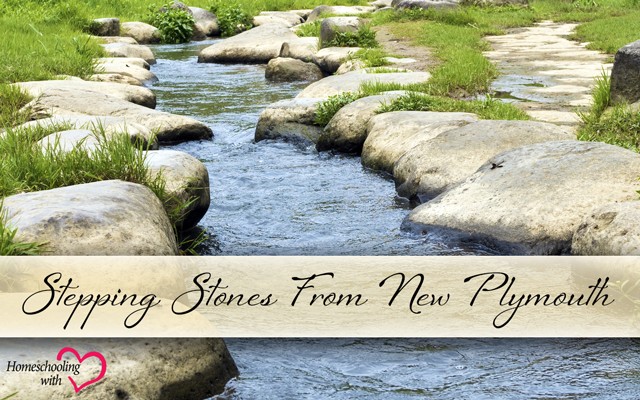Stepping Stones from New Plymouth


It is ingrained in the heart of man to live for something bigger than himself; and to die for something that will outlive him. It is what lifts him from a mere animal, hedonistic existence to what God intended for him.
“For whosoever will save his life shall lose it: but whosoever will lose his life for my sake, the same shall save it. For what is a man advantaged, if he gain the whole world, and lose himself, or be cast away?” (Luke 9:24-25)
Our Pilgrim forefathers (and mothers!) held such a vision and it sustained them through incredible odds and loss. They themselves drew hope from those who had gone before them. Governor William Bradford chronicles the “causes that led to the foundation of the New Plymouth Settlement, and the motives of those concerned in it.” Bradford then recounts Reformation martyrs of the previous century under Queen Mary. This hope from a former generation birthed hope in another who yet again passed it on to those coming behind them. When recording what drove this congregation to the distant American shores, Bradford reveals one of their reasons:
Last and not least, they cherished a great hope and inward zeal of laying good foundations, or at least of making some way towards it, for the propagation and advance of the gospel of the kingdom of Christ in the remote parts of the world, even though they should be but stepping stones to others in the performance of so great a work.
Eternity and earth become linked when one generation faithfully passes the torch of gospel hope to the next. But the Pilgrims were not the first to establish this pattern. Psalm 77 and 78 – the “Twin Psalms of History” – teach the direct link between our hope and remembering God’s work throughout the ages.
I have considered the days of old, the years of ancient times…I will remember the works of the LORD: surely I will remember thy wonders of old. I will meditate also of all thy work, and talk of thy doings. (Psalm 77:11-12)
Asaph, the penman of this Psalm, found hope, thinking on the past works of God. But he did not keep this hope to himself, as his next psalm displays:
Give ear, O my people, to my law: incline your ears to the words of my mouth…Which we have heard and known, and our fathers have told us. We will not hide them from their children, shewing to the generation to come the praises of the LORD, and his strength, and his wonderful works that he hath done. For he established a testimony in Jacob, and appointed a law in Israel, which he commanded our fathers, that they should make them known to their children: That the generation to come might know them, even the children which should be born; who should arise and declare them to their children: That they might set their hope in God, and not forget the works of God, but keep his commandments: (Psalm 78:1 & 3-7)
When viewed through a biblical lens, history is the bridge of hope into the future. May we build it strong and sturdy for the little feet carrying the gospel torch behind us.
Source: Of Plymouth Plantation by William Bradford, rendered into modern English by Harold Paget in 1909 and published by The Vision Forum 2009: p.1 & 21
Kenzi Knapp is a follower of Christ, homeschool graduate and student of history. A fourth generation Missourian she enjoys writing about daily life enrolled in Gods great course of faith and His story throughout the ages at her blog, Honey Rock Hills.











































